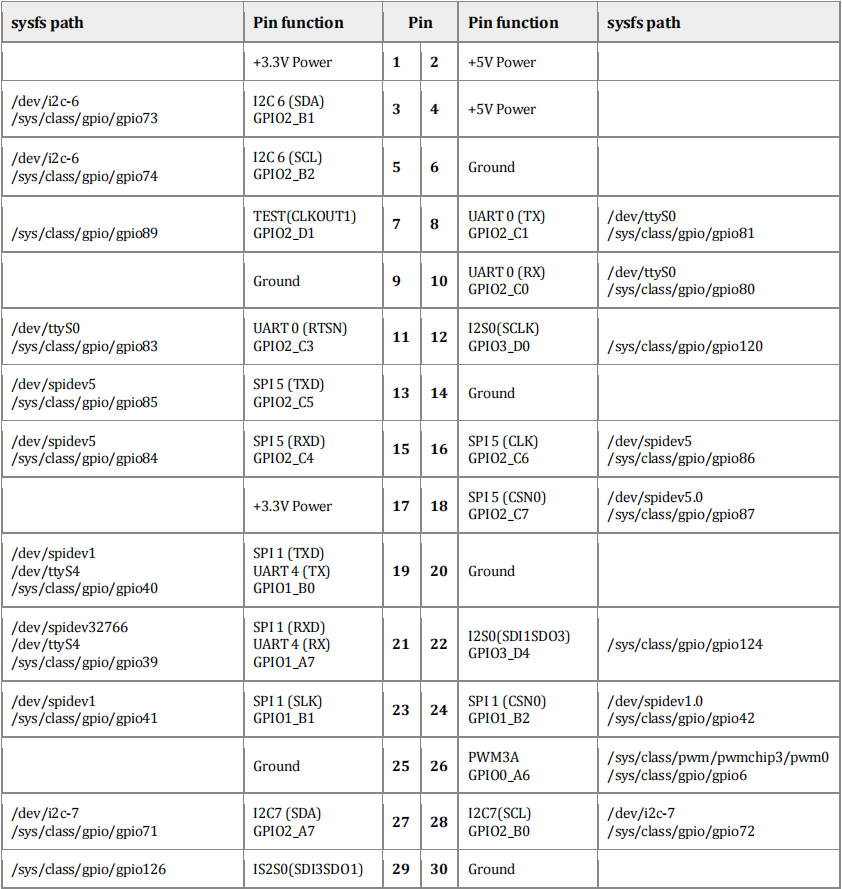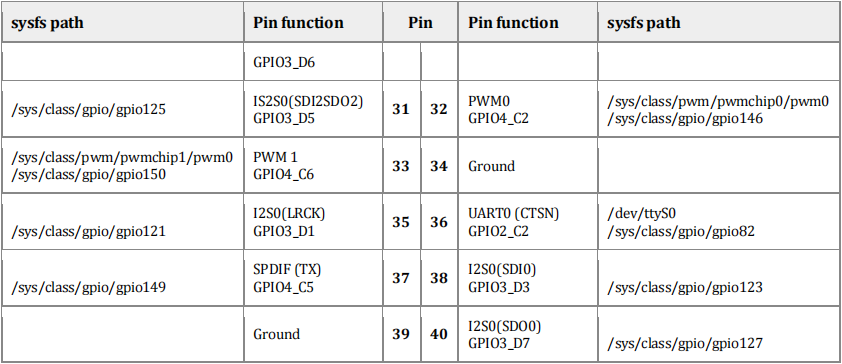平台:华硕 Thinker Edge R 瑞芯微 RK3399Pro
固件版本:Tinker_Edge_R-Debian-Stretch-V1.0.4-20200615
GPIO
(机翻)下表显示了座子的引脚,包括每个端口的sysfs路径,这通常是使用外围库时需要的名称。你也可以通过在命令行中输入pinout来查看座子的引脚。
备注:
I. 第32、33、37号I/O引脚为+3.0V电平,它有61K欧姆的内部下拉电阻,3mA驱动电流容量。
II. 除了32、33、37号引脚外,所有的I/O引脚都是+3.0V电平。32、33、37号引脚,其他引脚都是+3.3V电平,有5K~10K欧姆的内部上拉电阻,50mA的驱动电流容量。

 驱动库函数:
驱动库函数:
在/usr/local/share有如下文件:
 说明已预装wiringPi和RPi库
说明已预装wiringPi和RPi库
使用gpio readall命令查看引脚对应情况:

python3
python-periphery
参考资料:《Tinker_Edge_R_Getting_Started》
sudo apt-get update
sudo apt-get install python3-pip
sudo pip3 install python-periphery
(官方例程)在合适的地方编写代码
其使用CPU编号
from periphery import GPIO
import time
LED_Pin = 73 #Physical Pin-3 is GPIO 73
# Open GPIO /sys/class/gpio/gpio73 with output direction
LED_GPIO = GPIO(LED_Pin, "out")
while True:
try: #Blink the LED
LED_GPIO.write(True)
# Send HIGH to switch on LED
print("LED ON!")
time.sleep(0.5)
LED_GPIO.write(False)
# Send LOW to switch off LED
print("LED OFF!")
time.sleep(0.5)
except KeyboardInterrupt:
# Turn LED off before stopping
LED_GPIO.write(False)
break
except IOError:
print ("Error")
LED_GPIO.close()
运行
sudo python3 blink.py
可见LED灯闪烁

python2
RPi
在合适的地方编写代码:
nano blink.py
#!/usr/bin/env python2.7
# import ASUS.GPIO as GPIO
import RPi.GPIO as GPIO # 两种均可
from time import sleep # this lets us have a time delay
LED_PIN = 3
LED_PIN_BCM = 2
GPIO.setmode(GPIO.BOARD) # BOARD 对应 physical numbers
GPIO.setup(LED_PIN, GPIO.OUT, initial=GPIO.HIGH)
for _ in range(10):
GPIO.output(LED_PIN, GPIO.HIGH)
sleep(0.5)
GPIO.output(LED_PIN, GPIO.LOW)
sleep(0.5)
GPIO.output(LED_PIN, GPIO.HIGH)
GPIO.cleanup()
GPIO.setmode(GPIO.BCM) # BCM 对应 GPIO numbers
GPIO.setup(LED_PIN_BCM, GPIO.OUT, initial=GPIO.HIGH)
for _ in range(10):
GPIO.output(LED_PIN_BCM, GPIO.HIGH)
sleep(0.25)
GPIO.output(LED_PIN_BCM, GPIO.LOW)
sleep(0.25)
GPIO.output(LED_PIN_BCM, GPIO.HIGH)
GPIO.cleanup()
BCM —— GPIO numbers

(运行前记得把脚本中的中文删去)
sudo python2 ./blink.py可见LED灯闪烁
C语言
SysFs方式
本代码来自SysFs方式下C语言控制GPIO(RK3399)—— 姚家湾
编写
在合适的地方编写代码:
gpiolib.c
nano gpiolib.c
#include <stdio.h>
#include <stdlib.h>
#include <string.h>
#include <fcntl.h>
#include <unistd.h>
#include <sys/select.h>
#include <sys/stat.h>
#include "gpiolib.h"
int gpio_direction(int gpio, int dir)
{
int ret = 0;
char buf[50];
sprintf(buf, "/sys/class/gpio/gpio%d/direction", gpio);
int gpiofd = open(buf, O_WRONLY);
if (gpiofd < 0)
{
perror("Couldn't open IRQ file");
ret = -1;
}
if (dir == 2 && gpiofd)
{
if (3 != write(gpiofd, "high", 3))
{
perror("Couldn't set GPIO direction to out");
ret = -2;
}
}
if (dir == 1 && gpiofd)
{
if (3 != write(gpiofd, "out", 3))
{
perror("Couldn't set GPIO direction to out");
ret = -3;
}
}
else if (gpiofd)
{
if (2 != write(gpiofd, "in", 2))
{
perror("Couldn't set GPIO directio to in");
ret = -4;
}
}
close(gpiofd);
return ret;
}
int gpio_setedge(int gpio, int rising, int falling)
{
int ret = 0;
char buf[50];
sprintf(buf, "/sys/class/gpio/gpio%d/edge", gpio);
int gpiofd = open(buf, O_WRONLY);
if (gpiofd < 0)
{
perror("Couldn't open IRQ file");
ret = -1;
}
if (gpiofd && rising && falling)
{
if (4 != write(gpiofd, "both", 4))
{
perror("Failed to set IRQ to both falling & rising");
ret = -2;
}
}
else
{
if (rising && gpiofd)
{
if (6 != write(gpiofd, "rising", 6))
{
perror("Failed to set IRQ to rising");
ret = -2;
}
}
else if (falling && gpiofd)
{
if (7 != write(gpiofd, "falling", 7))
{
perror("Failed to set IRQ to falling");
ret = -3;
}
}
}
close(gpiofd);
return ret;
}
int gpio_export(int gpio)
{
int efd;
char buf[50];
int gpiofd, ret;
/* Quick test if it has already been exported */
sprintf(buf, "/sys/class/gpio/gpio%d/value", gpio);
efd = open(buf, O_WRONLY);
if (efd != -1)
{
close(efd);
return 0;
}
efd = open("/sys/class/gpio/export", O_WRONLY);
if (efd != -1)
{
sprintf(buf, "%d", gpio);
ret = write(efd, buf, strlen(buf));
if (ret < 0)
{
perror("Export failed");
return -2;
}
close(efd);
}
else
{
// If we can't open the export file, we probably
// dont have any gpio permissions
return -1;
}
return 0;
}
void gpio_unexport(int gpio)
{
int gpiofd, ret;
char buf[50];
gpiofd = open("/sys/class/gpio/unexport", O_WRONLY);
sprintf(buf, "%d", gpio);
ret = write(gpiofd, buf, strlen(buf));
close(gpiofd);
}
int gpio_getfd(int gpio)
{
char in[3] = {0, 0, 0};
char buf[50];
int gpiofd;
sprintf(buf, "/sys/class/gpio/gpio%d/value", gpio);
gpiofd = open(buf, O_RDWR);
if (gpiofd < 0)
{
fprintf(stderr, "Failed to open gpio %d value\n", gpio);
perror("gpio failed");
}
return gpiofd;
}
int gpio_read(int gpio)
{
char in[3] = {0, 0, 0};
char buf[50];
int nread, gpiofd;
sprintf(buf, "/sys/class/gpio/gpio%d/value", gpio);
gpiofd = open(buf, O_RDWR);
if (gpiofd < 0)
{
fprintf(stderr, "Failed to open gpio %d value\n", gpio);
perror("gpio failed");
}
do
{
nread = read(gpiofd, in, 1);
} while (nread == 0);
if (nread == -1)
{
perror("GPIO Read failed");
return -1;
}
close(gpiofd);
return atoi(in);
}
int gpio_write(int gpio, int val)
{
char buf[50];
int nread, ret, gpiofd;
sprintf(buf, "/sys/class/gpio/gpio%d/value", gpio);
gpiofd = open(buf, O_RDWR);
if (gpiofd > 0)
{
snprintf(buf, 2, "%d", val);
ret = write(gpiofd, buf, 2);
if (ret < 0)
{
perror("failed to set gpio");
return 1;
}
close(gpiofd);
if (ret == 2)
return 0;
}
return 1;
}
int gpio_select(int gpio)
{
char gpio_irq[64];
int ret = 0, buf, irqfd;
fd_set fds;
FD_ZERO(&fds);
snprintf(gpio_irq, sizeof(gpio_irq), "/sys/class/gpio/gpio%d/value", gpio);
irqfd = open(gpio_irq, O_RDONLY, S_IREAD);
if (irqfd < 1)
{
perror("Couldn't open the value file");
return -13;
}
// Read first since there is always an initial status
ret = read(irqfd, &buf, sizeof(buf));
while (1)
{
FD_SET(irqfd, &fds);
ret = select(irqfd + 1, NULL, NULL, &fds, NULL);
if (FD_ISSET(irqfd, &fds))
{
FD_CLR(irqfd, &fds); // Remove the filedes from set
// Clear the junk data in the IRQ file
ret = read(irqfd, &buf, sizeof(buf));
return 1;
}
}
}
gpiolib.h
nano gpiolib.h
#ifndef _GPIOLIB_H_
#define _GPIOLIB_H_
/* returns -1 or the file descriptor of the gpio value file */
int gpio_export(int gpio);
/* Set direction to 2 = high output, 1 low output, 0 input */
int gpio_direction(int gpio, int dir);
/* Release the GPIO to be claimed by other processes or a kernel driver */
void gpio_unexport(int gpio);
/* Single GPIO read */
int gpio_read(int gpio);
/* Set GPIO to val (1 = high) */
int gpio_write(int gpio, int val);
/* Set which edge(s) causes the value select to return */
int gpio_setedge(int gpio, int rising, int falling);
/* Blocks on select until GPIO toggles on edge */
int gpio_select(int gpio);
/* Return the GPIO file descriptor */
int gpio_getfd(int gpio);
#endif //_GPIOLIB_H_
main.c
nano main.c
其使用CPU编号
#include <stdlib.h>
#include <stdio.h>
#include <unistd.h>
#include "gpiolib.h"
int main(int argc, char **argv)
{
int gpio_pin;
if (argc != 2)
{
printf("Too few parameters in call!\r\n");
return -1;
}
gpio_pin = atoi(argv[1]);
gpio_export(gpio_pin);
gpio_direction(gpio_pin, 1);
for (int i = 0; i < 5; i++)
{
printf(">> GPIO %d Low\n", gpio_pin);
gpio_write(gpio_pin, 0);
sleep(1);
printf(">> GPIO %d High\n", gpio_pin);
gpio_write(gpio_pin, 1);
sleep(1);
}
gpio_unexport(gpio_pin);
return 0;
}
编译
编写Makefile文件
nano Makefile
main: main.o gpiolib.o
cc -o main main.o gpiolib.o
main.o: main.c gpiolib.h
cc -c main.c gpiolib.h
gpiolib.o: gpiolib.c gpiolib.h
cc -c gpiolib.c
.PHONY:clear
clear:
rm *.o
rm main
编译
make
测试
可见LED灯闪烁
chmod +x ./main
sudo ./main 73
wiringPi
编写
在合适的地方编写代码:
其使用wiringPi编号
nano main.c
#include <wiringPi.h>
int main(int argc, char * argv[])
{
char i;
wiringPiSetup();
pinMode(8, OUTPUT);
for(i = 0; i < 10; ++i)
{
digitalWrite(8, HIGH);
delay(500);
digitalWrite(8, LOW);
delay(500);
}
digitalWrite(8, HIGH);
return 0;
}
编译
gcc -o main.o main.c -lwiringPi
运行目标文件
sudo ./main.o
可见LED灯闪烁
bash
在合适的地方编写代码:
其使用wiringPi编号
nano blink.sh
# !/bin/bash
PIN=8
gpio mode $PIN out
while true; do
gpio write $PIN 1
sleep 0.5
gpio write $PIN 0
sleep 0.5
done
运行:
sh blink.sh
可见LED灯闪烁























 944
944











 被折叠的 条评论
为什么被折叠?
被折叠的 条评论
为什么被折叠?










